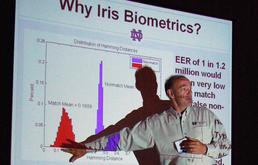Seminar 25th June 2010 noon University of Southampton Building 6 Room 1083
Iris Biometrics Research
Professor Kevin W. Bowyer
University of Notre Dame
- Web page
- http://www.ecs.soton.ac.uk/seminars/566
- Submitter
- Petrina Butler
Abstract
This talk presents an overview of recent iris biometrics research results from our group. Topics covered include the effects of pupil dilation on iris biometrics accuracy, the effects of contact lenses on accuracy, the existence of a template aging effect, and an experiment in which human observers are able to recognize a similarity in the texture of left and right irises that is not detected by current automated iris biometrics technology. A common theme connecting these results is that they can be seen as contradicting "conventional wisdom" about iris biometrics. It should not be necesssary to already be working in iris biometrics in order to understand this talk.
Speaker Biography
Kevin Bowyer currently serves as Schubmehl-Prein Professor and Chair of the Department of Computer Science and Engineering at the University of Notre Dame. His recent research activities focus on problems in biometrics and in data mining. Particular contributions in biometrics include algorithms for improved accuracy in iris biometrics, face recognition using three-dimensional shape, 2D and 3D ear biometrics, advances in multi-modal biometrics, and support of the government’s Face Recognition Grand Challenge, Iris Challenge Evaluation, Face Recognition Vendor Test 2006 and Multiple Biometric Grand Challenge programs. His paper “Face Recognition Technology: Security Versus Privacy,” published in IEEE Technology and Society, was recognized with an "Award of Excellence" from the Society for Technical Communication in 2005. His data mining research has been supported by Sandia National Laboratories. This work focuses on classifier ensemble techniques for problems that exhibit “extreme” characteristics, such as a high imbalance between classes, unusually large size of training data, and noise in the class labels of the training data. Professor Bowyer earned his PhD in Computer Science from Duke University. Following a year at the Institute for Informatics at ETH in Zurich, Professor Bowyer joined the Department of Computer Science and Engineering at the University of South Florida. While at USF, Professor Bowyer won three teaching awards, received a Distinguished Faculty Award for his mentoring work with under-represented students in the McNair Scholars Program, and was awarded a sequence of five National Science Foundation site grants for Research Experiences for Undergraduates. In addition, he created the textbook Ethics and Computing, and led a series of NSF-sponsored workshops on curriculum development in this area. Also during this time, Professor Bowyer served as Editor-In-Chief of the IEEE Transactions on Pattern Analysis and Machine Intelligence, recognized as the premier journal in its areas of coverage, and was elected an IEEE Fellow for his research in object recognition. Professor Bowyer is the founding General Chair of the IEEE International Conference on Biometrics Theory, Applications and Systems (BTAS).
Further Information
please contact Dr. Sasan Mahmoodi sm3@ecs.soton.ac.uk
